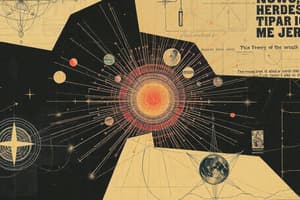Podcast
Questions and Answers
What does the peak of the Maxwell speed distribution represent?
What does the peak of the Maxwell speed distribution represent?
- The most probable speed of a particle (correct)
- The average speed of all particles
- The minimum speed of a particle
- The maximum speed of any particle
How does the Maxwell speed distribution change with increasing temperature?
How does the Maxwell speed distribution change with increasing temperature?
- The distribution becomes more uniform
- The peak shifts to the left
- The peak remains unchanged
- The peak shifts to the right (correct)
Which assumption is made about the particles in the ideal gas model?
Which assumption is made about the particles in the ideal gas model?
- Particles interact through inelastic collisions
- Particles do not experience random motion
- Particles are modeled as hard spheres (correct)
- Particles have varying densities
What characterizes the motion of particles in an ideal gas?
What characterizes the motion of particles in an ideal gas?
What does the kinetic theory of gases primarily describe?
What does the kinetic theory of gases primarily describe?
Which expression correctly relates pressure to the momentum change of gas particles?
Which expression correctly relates pressure to the momentum change of gas particles?
Which of the following statements best describes the root-mean-square speed of gas particles?
Which of the following statements best describes the root-mean-square speed of gas particles?
What does the ideal gas law relate to temperature?
What does the ideal gas law relate to temperature?
How is temperature defined in terms of kinetic energy in an ideal gas?
How is temperature defined in terms of kinetic energy in an ideal gas?
In a cubical container with N identical particles, which quantity changes when a particle collides with the wall?
In a cubical container with N identical particles, which quantity changes when a particle collides with the wall?
What does the expression $KE = \frac{1}{2}mv^2$ represent in terms of particle motion?
What does the expression $KE = \frac{1}{2}mv^2$ represent in terms of particle motion?
Which of the following is NOT a characteristic of an ideal gas according to the kinetic theory?
Which of the following is NOT a characteristic of an ideal gas according to the kinetic theory?
What happens to gas pressure if the temperature increases while the volume remains constant?
What happens to gas pressure if the temperature increases while the volume remains constant?
Flashcards
Ideal Gas
Ideal Gas
An ideal gas is a theoretical gas that has certain properties: low density, particles modeled as hard spheres with elastic collisions, and particles in random motion.
Maxwell Speed Distribution
Maxwell Speed Distribution
The Maxwell speed distribution describes the range of speeds of the particles in a gas at a constant temperature.
Most Probable Speed (vmp)
Most Probable Speed (vmp)
The most probable speed (vmp) on the Maxwell speed distribution represents the speed that the most particles in a gas have.
Temperature & Maxwell Distribution
Temperature & Maxwell Distribution
Signup and view all the flashcards
Microscopic Definition of Temperature
Microscopic Definition of Temperature
Signup and view all the flashcards
Root-mean-square speed (vrms)
Root-mean-square speed (vrms)
Signup and view all the flashcards
Average speed (v)
Average speed (v)
Signup and view all the flashcards
Pressure of an ideal gas
Pressure of an ideal gas
Signup and view all the flashcards
Ideal gas law
Ideal gas law
Signup and view all the flashcards
Average kinetic energy of gas particles
Average kinetic energy of gas particles
Signup and view all the flashcards
Temperature and kinetic energy
Temperature and kinetic energy
Signup and view all the flashcards
Kinetic theory of gases
Kinetic theory of gases
Signup and view all the flashcards
Study Notes
Kinetic Theory of Gases
- Ideal gases have low density, but contain many particles.
- Particles are modeled as hard spheres.
- Collisions between particles and container walls are elastic.
- Particles move randomly and undergo many collisions per second.
- Collisions cause changes in particle speed and direction.
- While individual particle speeds vary, average particle speed can be calculated.
Maxwell Speed Distribution
- James Clerk Maxwell calculated the distribution of particle speeds in a large collection of atoms/molecules at constant temperature.
- The most probable speed is related to the temperature.
- As temperature increases, the most probable speed increases and the distribution graph shifts to the right.
- Root-mean-square speed (vrms) is always slightly higher than the most probable speed (vmp).
- The average speed (v) lies between vmp and vrms.
Microscopic Definition of Temperature
- Temperature is a measure of the average kinetic energy of particles in matter.
- The average kinetic energy of a particle is related to its velocity-squared through the equation KE=1/2mv2rms=3/2kT, where m is the mass of the particle, vrms is the root-mean-square speed, k is the Boltzmann constant, and T is the temperature.
Studying That Suits You
Use AI to generate personalized quizzes and flashcards to suit your learning preferences.




